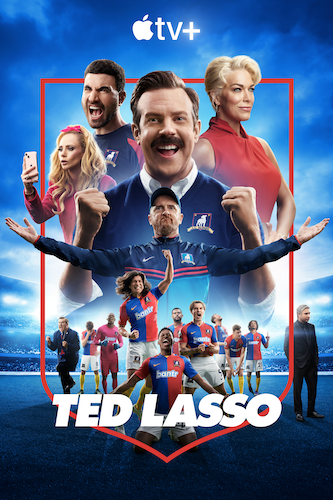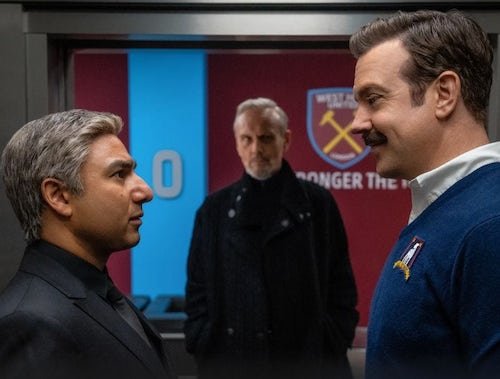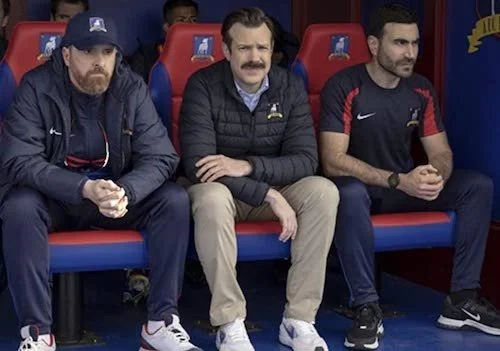Ted Lasso Season 3: Binge, Fringe, or Singe?
Written by Andreas Babiolakis
Binge, Fringe, or Singe? is our television series that will cover the latest seasons, miniseries, and more. Binge is our recommendation to marathon the reviewed season. Fringe means it won’t be everyone’s favourite show, but is worth a try (maybe there are issues with it). Singe means to avoid the reviewed series at all costs.
Warning: This review contains thorough spoilers for Ted Lasso. Reader discretion is strongly advised.
I’m likely going to be crucified by the majority of Ted Lasso’s fans. I apologize in advance.
I was a huge fan of the second season of Apple TV+’s flagship series because it really did seem to achieve the right balance between being a comfort show and a feel-good series that still has stirring storylines. It was always speculated that this third season would be the final one of the series because of the floating rumours about scheduling conflicts, particularly ones that star Jason Sudeikis faced (for good reason: he was always big, but Ted Lasso made him untouchable in the world of comedy television). I was excited to see how this series would close out. Its origins come from promotional material for NBC Sports, so this show really shouldn’t have been as good as it is. When Season 3 was about to kick off, it felt like a miracle: a show about a fish-out-of-water Wichita native having to coach football (soccer for us Americans) from the bottom of the English Premier League to someplace respectable. It was actually good. Really good.
In case you don’t know, there has been an insane conspiracy theory about Brett Goldstein (who plays the loveable grouch Roy Kent) where people think he is a CGI character played by AI: something Apple would reveal after the series is done as their crowning achievement of the series, especially since the actor won Emmys (but, rest assured, Brett Goldstein is a real dude). If that is the case, can we start speculating that at least parts of Season 3 were written by ChatGPT? The season begins with some of the flattest jokes and oddest storylines of the series, and it even feels as though Ted Lasso completely loses its way at times. It was always rooted in reality, yet master footballer Zava (one of the league’s best players who joins AFC Richmond) is nearly cartoonish as a caricature. Nate Shelley is now with West Ham United and we’re meant to be sour about this, but Ted Lasso initially makes his character so unlikeable that I frankly didn’t care for his change-of-heart return towards the end of the season. Ted Lasso himself has seemingly gone back to knowing next to nothing about football: has he really regressed? Roy Kent — my favourite character — almost feels like a bumbling horsefly at times, and I hate what such a complex character has been reduced to.
Season 3 of Ted Lasso is its own best friend, but also its worst enemy; it gets in the way of continued greatness on at least a few occasions.
The skinny is that AFC Richmond are on route to being dead last in the league, and it seems as though Nate leaving was the reason why: his new team, West Ham, has high ambitions to move up. There are many personal problems at home; Ted is feeling estranged from his family especially now that his wife (who he is separating from) is seeing their therapist (ouch); Roy and Keeley Jones break up because of their devotions to their jobs, and the latter begins a relationship wth venture capitalist Jack Danvers (who is the sole reason why Keeley’s PR firm can afford to exist); Nate feels like hot shit, but he is getting alienated from those he once used to care about (gee, maybe stop being such a jackass them); Rebecca Walton begins rethinking her entire life once she visits the psychic her mother frequently sees; the list goes on.
Some of these subplots are handled pretty well. I feel like Rebecca’s existential crisis is fitting for someone who was handed over a dumpster fire of a team that she eventually grew to nurture, and she wants to see if she will be fit to be a mother (or if she will ever even find love again). It’s actually the most interesting subplot (even more than Ted’s). Colin Hughes’ story — where he feels forced to come out in an industry which is usually exceptionally hostile to the LGBTQ+ community — is also handled nicely, and the similar statements on racism in sports is usually approached properly (occasionally it can feel shoehorned in, but not often).
I have a bigger issue with the storylines that don’t go anywhere. Nate is a dick, he has a change of heart, he comes back to AFC Richmond after refusing to out of guilt, and it’s as if nothing changed. What did he learn outside of he likes the people he already liked until he was made to feel inadequate there? It’s a non-issue that could have been resolved in two episodes (three, max), but instead Ted Lasso makes Nate unbearable to try and force this character arc that didn’t need to be this long (and Nate was easily one of the more loveable characters in an already comforting show, which says a lot). Keeley’s storyline takes prominence at times, and it’s another one that kind of runs in circles, boasts some annoying characters (good riddance to Shandy Fine: a single-punchline joke that wouldn’t stop repeating at full volume). Roy Kent has been reduced to a husk of his former self, but at least he is given juicy material when he winds up training Jamie Tartt to victory (that’s a full-circle moment I can get behind).
Many are predicting that the Golden Age of Television is ending, myself included; if not now, soon. Part of the reason why I feel this way is because the age of cable TV opened up a series of possibilities for storytellers to work with, and streaming seemingly continued this streak in the early 2010s. Gone were the days of network strangleholds that constricted what you can show on the small screen. With so many brilliant shows already made, I feel like we are beginning to head in the opposite direction: free reign being an issue and not a solution. Ted Lasso in its third season feels unhinged, but it was always meant to be a feel-good show (so safe, but not in a bad way: some shows are just meant to make you happier). With the series feeling the need to reach an episode quota to matter for a third season, some storylines just shouldn’t have existed: they are there just to pad the series out. With that in mind, I must ask, why the fuck Ted Lasso episodes need to consistently be over an hour long. Some episodes beg to be longer, like “Mom City”, finale “So Long, Farewell”, and especially “Sunflowers” (a series highlight for sure). Not every episode needs to be an hour. If they must be, have fewer episodes and have tighter writing. Either that or trim the length of the majority of these twelve episodes and have less nonsensical plot threads going on that bog down a series that once felt effortless to watch (at times, season 3 felt like an absolute chore).
In the face of adversity, Ted Lasso finds a way to shine.
It seemed like it would be at first, but Ted Lasso’s third season thankfully isn’t a complete bust. It rights the ship during “Sunflowers”: a team escape to Amsterdam to try and get everyone to stop thinking about their awful losses and respect one another as a unified team again. It’s fun, adventurous, and a deep dive into these characters as actual people. Even Roy Kent’s storyline here gets more interesting. There are still dips in quality at times after this episode, but it is the first one —midway through season 3, mind you — that feels like things will be okay. From that point on, there are some misses but far more hits coming your way, and it’s no coincidence that it’s when the team (after a revelation in strategy from Ted Lasso’s triangle offence/total football approach) begins to play better. I’m not saying that there shouldn’t have ever been any conflict, but I feel like the Apple TV+ series was trying to create flat issues where there shouldn’t have been any all in the name of having more content.
As Ted Lasso resolves, it heads into predictable territory, but it really does handle cheese and triumph really well. Some of the jokes even feel more sincere. We are left with two strong sendoff episodes and they are all hinged around the fact that Ted Lasso no longer feels like he doesn’t belong: nonetheless, he still misses the place he truly identifies as home. The season (and series?) wraps up with closure: that Ted Lasso just wants to be a dad and he is proud of what he has achieved overseas. AFC Richmond win their final match against rivals West Ham (they sadly don’t win the league when Manchester City dominate their must-win game, but they came second after being in dead last at the start of the season, and that is good enough). Rebecca initially wants to sell the team should Ted leave, but she decides to share it with who deserve it the most: the dedicated fans who now own forty nine percent of AFC Richmond. There are many other closures here that either feel right or at least welcome since everything else is wrapping up.
Ted Lasso’s final season really replicated AFC Richmond’s final season (that we see, anyway). It was a sight for sore eyes at first, but it won our hearts in the end. It’s not great that the show now possesses quite a few blemishes, but that likely never mattered to diehard Ted Lasso fans who will stick by the series no matter what: Ted Lasso could move to Tahiti to become a ska trumpeter while cyborgs invade with the former coach becoming the face of a post apocalyptic movement, and people would still watch. Guaranteed. I think those that watch Ted Lasso just to keep up with it will likely have a tougher time, but the ending of the show (I think) will tend to even the coldest hearts. I just wish it was a less rocky road, but if the aw-shucks nature of the titular coach taught us anything, it’s that not every path will be a pleasant one, and things don’t always go the way that we want. Besides, we will always have season 2 and select standout episodes that we can revisit without feeling the need to watch the ones that are worse; Ted Lasso is a forgiving-enough show where you can be selective with it. Even during its lower points, it’s nice to have a show as kind and uplifting as Ted Lasso during these dark times anyway, so I won’t completely write it off.
But please just end the series here. Everything is resolved. Season 3 was an indication that this show can meander and lose its way. If you want to keep the joy of the series, maybe have a spinoff. Don’t run Ted Lasso into the ground. We’ve seen that it’s possible. Just accept this late-game win.
Andreas Babiolakis has a Masters degree in Film and Photography Preservation and Collections Management from Toronto Metropolitan University, as well as a Bachelors degree in Cinema Studies from York University. His favourite times of year are the Criterion Collection flash sales and the annual Toronto International Film Festival.






